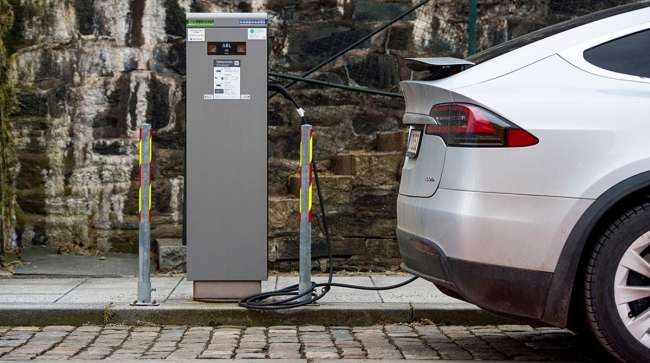Staff Reporter
25 States Send EPA a Letter Opposing Emissions Proposal

[Stay on top of transportation news: Get TTNews in your inbox.]
Kentucky and West Virginia are leading a 25-state coalition in challenging emissions regulations proposed by the Biden administration that aim to phase out fossil fuel-powered vehicles in favor of alternative power options such as electric vehicles.
Kentucky Attorney General Daniel Cameron, his West Virginia counterpart Patrick Morrisey and a coalition of their peers sent a 20-page letter to U.S. Environmental Protection Agency Administrator Michael Regan with comments critical of the EPA’s proposed Multi-Pollutant Emissions Standards for Model Years 2027 and Later Light-Duty and Medium-Duty Vehicles.
“President [Joe] Biden wants to use the power of government to force a massive shift in demand for automobiles, with the government putting its thumb on the scale in favor of EVs. But Americans don’t want what he is selling,” Cameron stated in an announcement. “This is the latest head-in-the-sand approach to achieving the left’s impossible green-energy fantasies. Government shouldn’t pick winners and losers, and an EPA rule that would kill gas-powered vehicles does just that.”
Morrisey released a statement calling the EPA’s proposed rule legally flawed and unrealistic.
I will continue to challenge the Biden Administration’s most radical regulations yet on tailpipe emissions. The President’s plan would forcibly phase out gas-powered vehicles & restructure the automobile industry around EVs at a breakneck pace.
Check out my thoughts on @Foxnews pic.twitter.com/5k4bF0KNRG — Attorney General Daniel Cameron (@kyoag) July 15, 2023
“This would have devastating effects in the daily lives of consumers — many of whom are already suffering from the burdens of historically high inflation,” Morrisey declared. “This is an attack on rural America and rural Americans who are working really hard to make ends meet who are going to get bludgeoned by this rule.”
Morrisey said he was continuing his stance of safeguarding the financial interests of his state residents, especially during current economic challenges. He also accused the Biden administration of trying to destroy U.S. energy production through regulations that would force closure of coal- and gas-fired power plants that form the nation’s power generation backbone.
“We have settled this issue in last year’s U.S. Supreme Court decision in West Virginia v. EPA, which specifically ruled the EPA must regulate within the express boundaries of the statute that Congress passed — the agency can’t regulate similar matters without explicit congressional authorization,” Morrisey said.
Three pages of the EPA letter contained signatures of attorneys general from Alabama, Alaska, Arkansas, Florida, Idaho, Indiana, Iowa, Kansas, Kentucky, Louisiana, Mississippi, Missouri, Montana, Nebraska, North Dakota, Ohio, Oklahoma, South Carolina, South Dakota, Tennessee, Texas, Utah, Virginia, West Virginia and Wyoming.
At @EPA, we’re pulling out all the stops to decarbonize our nation’s transportation sector.
From deploying electric school buses to reducing emissions from light and heavy-duty vehicles, we’re accelerating our transition to a clean transportation future! 🚗⚡ — Michael Regan, U.S. EPA (@EPAMichaelRegan) July 17, 2023
The coalition declared the EPA is trying to force vehicle manufacturers to build fewer vehicles with internal combustion engines and make more EVs instead.
“The numbers are staggering: EPA expects that the proposal will create enough EVs to penetrate 67% and 46% of overall light- and medium-duty vehicle sales, respectively, in less than a decade,” the attorneys general noted. If the proposed rule is adopted it “would damage our economy, tax our electrical grids and the families and businesses who depend on them, and threaten our national security,” they said.
The letter alleged several problems with the EPA’s proposal, including that it exceeds the agency’s statutory authority and is legally “arbitrary and capricious” by relying on a faulty premise that treats EVs as zero-emitting vehicles. The letter also alleges inaccurate cost-benefit projections.
The states also charge that the rule would require significant transformational hurdles. In particular, they said that neither the U.S. electrical grids nor the national automotive supply chain are ready for such a rule, and stressed that consumers are unwilling to accept the EPA’s proposed electrification mandate.
“The alleged savings for reduced fuel consumption are based on layers of speculation. The shift to EVs is projected to ‘reduce liquid fuel consumption (gasoline and diesel) while simultaneously increasing electricity consumption,’ ” noted the attorneys general. “Whether such a transformation is possible given resource limitations, geopolitical factors, permitting issues, land-use debates, jurisdictional policy differences and litigation is still to be determined. Even if it is possible, EPA cannot predict with any accuracy the costs to the retail ratepayer for completing such a drastic transition. In short, no one knows with enough certainty to justify massive regulatory shifts whether charging an EV will be more cost-effective than refueling a gasoline engine.”
In TRB keynote, #NTSB Chair Homendy focuses on victims of transportation crashes; also raises safety impact of electric vehicles: https://t.co/7legjATdaM pic.twitter.com/bzBeMUfMu9 — NTSB Newsroom (@NTSB_Newsroom) January 11, 2023
The coalition also said EPA failed to consider the “adverse safety impacts” of an EV mandate, and pointed to a January speech from National Transportation Safety Board Chair Jennifer Homendy. While not quoted directly in the letter, Homendy during a keynote address at the Transportation Research Board’s 2023 Annual Meeting raised alarm bells about EVs.
“I’m concerned about the increased risk of severe injury and death for all road users from heavier curb weights and increasing size, power and performance of vehicles on our roads, including electric vehicles,” she said. “A GMC Hummer EV weighs over 9,000 pounds. Its gross vehicle weight rating is a staggering 10,550 pounds. The battery pack alone weighs over 2,900 pounds — about the weight of a Honda Civic. The Ford F-150 Lightning is between 2,000 and 3,000 pounds heavier than the nonelectric version. The Mustang Mach-E, Volvo XC40 EV and RAV4 EV are all roughly 33% heavier. That has a significant impact on safety for all road users.”
Want more news? Listen to today's daily briefing below or go here for more info:




